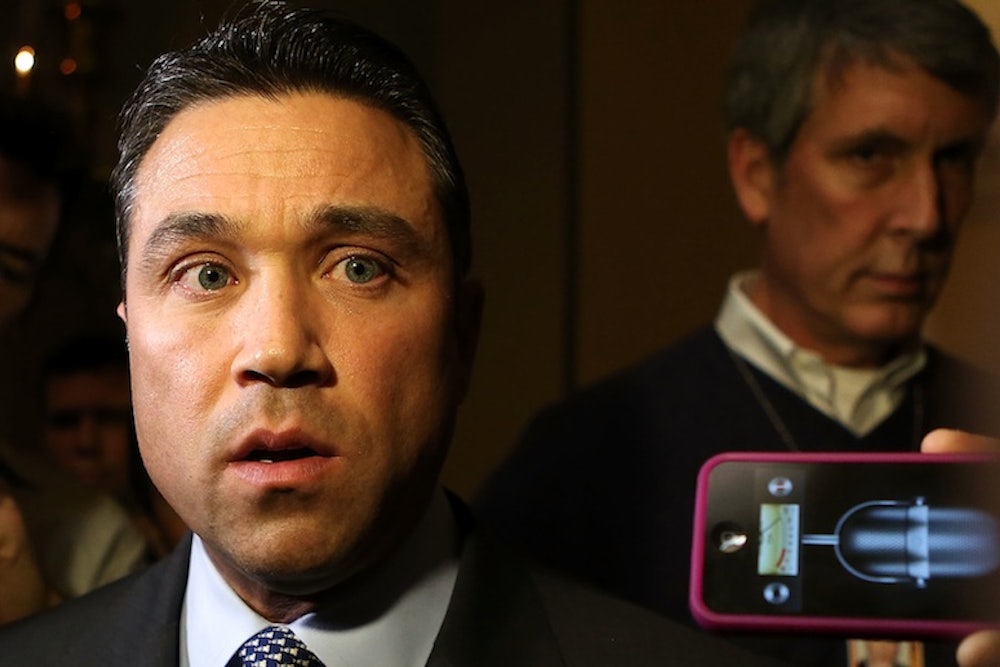When NY1 reporter Michael Scotto tried to ask Michael Grimm, a Republican congressman from Staten Island, about his campaign finance troubles in an interview after Tuesday's State of the Union address, he found his manhood challenged. Grimm, a Marine Corps vet and a former FBI agent, said, “Let me be clear to you, you ever do that to me again I’ll throw you off this fucking balcony,” and later added, “No, no, you’re not man enough. You're not man enough. I’ll break you in half. Like a boy.”
Evan Ratliff, who wrote a 2011 New Yorker piece about Grimm's undercover work that included allegations of similar threats, said the "exchange with Scotto had a familiar ring to it." In a blog post Wednesday, Ratliff wrote, "In Grimm’s world, there are men of great character, whose conduct stands above questioning, and boys, who come—as Grimm once put it to me—only to 'demean and belittle' it."
This notion of manhood is exactly what President Barack Obama appropriated in his weekly address on Saturday, in which he discussed the new White House Task Force on Protecting Students from Sexual Assault. “I want every young man in America to know that real men do not hurt women,” he said.
Obama’s address echoed what Vice President Joe Biden said on the subject recently: “Men have to take more responsibility; men have to intervene…the measure of manhood is willingness to speak up and speak out, and begin to change the culture.”
Obama and Biden mean well. Aware that many American men think being "a real man" means conquering women and otherwise acting aggressively, they want to reframe masculinity in terms of protecting women and otherwise acting responsibly. “Masculinity is something that is problematic, that encourages men to use violence against women,” said Meghana Kulkarni, a coordinator with the University of Michigan's Sexual Assault Prevention and Awareness Center. “But if we are trying to reframe masculinity in a way that supports women rather than what encourages sexual violence against them, that’s the best way to reach an audience.”
These could be perceived as competing concepts of masculinity. As Michael Kimmel, the author of Guyland and Angry White Men, told me, the “real man” ideal can reinforce buffoonish masculinized behavior, but it can also encourage the opposite. “Very often when we hear ‘be a man’ we get this caricature about frat boys who don’t cry or don’t show their feelings," he said. "That’s partly true but I think there’s another part of it. Most men would also tell me that it means to act with integrity, honor, respect, and standing up for the little guy.” In other words, Grimm's "real man" is aggressive and uses intimidation to make the weak cower. Obama and Biden's "real man" is noble and realizes that Grimm's "real man" is an asshole.
Still, even Obama and Biden’s enlightened interpretation of masculinity is likely more damaging than it is empowering. To make their case, they're leaning on an inherently sexist interpretation of the concept—men as self-appointed protectors—when they should be discarding it entirely. There is no such thing as a "real man," good or bad, because masculinity itself is a myth. As Dana Bolger, co-founder of the Know Your IX campaign against sexual violence campus, said to me in an email, “The whole idea that there’s a ‘real man’ out there is ludicrous. I mean, what’s an ‘unreal man’? There’s no value in gender conformity and we shouldn’t elevate it as an ideal.”
